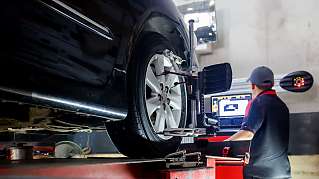Fleet management
Optimize your business with tools that can save you time and money
Fleet management
Optimize your business with tools that can save you time and money
Fleet management is a term that describes the practices and technologies used by companies to manage their commercial vehicle fleets. This includes a range of activities such as vehicle maintenance, fuel management, driver safety, and logistics planning.
The goal of fleet management is to increase operational efficiency, reduce costs, and improve overall fleet performance. Fleet management solutions can involve software, GPS tracking systems, telematics, and other advanced technologies to provide real-time insights that help companies optimize their fleet operations. Find out everything you need to know about fleet management here.
Webfleet helps you track your vehicles, cut your fuel costs and run more efficiently — all from a single dashboard. Discover what you can do with our fleet management system.
Explore our fleet management solutions
Vehicle tracking
Vehicle tracking
Optimize your operations and reduce cost with real time GPS vehicle tracking.
Fleet safety and maintenance
Fleet safety and maintenance
Contribute to a culture of road safety across your fleet
Workflow management
Workflow management
Helping you to manage your workflow, improve customer service and get more jobs done
Compliance
Compliance
Comply effortlessly with automated tasks and accurate data
Fleet sustainability and electric vehicles
Fleet sustainability and electric vehicles
Run an environmentally responsible fleet
A fleet management system helps you
Know where your vehicles are 24/7
Through real-time track and trace
Make smarter and faster decisions
By analyzing fleet performance data
Protect your drivers and vehicles
With tools to prevent accidents and reduce downtime
Avoid fines and reputational damage
By ensuring your drivers, vehicles, and company stay compliant
Get more jobs done and cut costs
With optimized order and workflow management
Reduce your CO2 emissions and save fuel
By running more sustainably and managing EVs efficiently
Explore all fleet management solutions
Vehicle tracking
Get the precise, real-time location of every vehicle in your fleet. Assign jobs based on the driver closest to your customers. Access vehicle data and understand the impact of driving behavior on fuel consumption. Looking to cut costs? Webfleet Vehicle Tracking makes it easy to analyze historical and real-time data, so you can identify where to make operational improvements.
Features:
- Real-time vehicle and asset tracking
- Dashcam, mobile app, and OEM tracking
- Dashboard and customizable reports
- Notifications and alerts


Fleet safety and maintenance
Improve safety for everyone on the road while lowering maintenance costs. With an AI-powered dashcam, Webfleet Video gives you the full context of accidents. Retrieve evidential footage directly from your account, helping you reduce false claims and save on insurance premiums. Keep your vehicles roadworthy with tools to monitor their condition in real time.
Features:
- Driver insights and coaching
- AI-enabled fleet dashcam
- Driving times
- Instant driving events and maintenance alerts
- Digitized vehicle inspections
- Tire pressure monitoring
Workflow management
Operate with greater flexibility when you connect Webfleet to a PRO Driver Terminal or our Work App. Stay on top of job orders and driver availability. Communicate seamlessly with your team in the field, who can send you order status updates and ETAs. From your account dashboard, you get a clear picture on crucial data like time spent at a customer's location and working times.
Features:
- Professional navigation
- Order schedule optimization
- Proof of delivery
- API integration
- Mobile apps for fleet managers and drivers


Sustainability and electric vehicles (EVs)
Wherever you may be on your decarbonization journey, Webfleet can help you run a more environmentally responsible fleet. Operate more sustainably by cutting your fleet's fuel consumption — or adding EVs to your fleet. Our fleet management system empowers drivers to adopt greener driving behaviors.
Features:
- CO2 emissions monitoring and reporting
- Fuel consumption monitoring and analysis
- Active driver feedback and coaching
- Fleet management for EVs
- Tools to support a transition to EVs
Compliance
Keeping your drivers, vehicles, and company compliant with evolving regulations is easier with Webfleet. Our range of fleet compliance solutions helps you reduce costs, avoid penalties, increase productivity, and focus on delivering more value to your customers. Do you manage a cold chain fleet? Webfleet gives you real-time visibility and control over the temperature of all your refrigerated vehicles.
Features:
- Tachograph management
- Mileage data tracking
- Digitized vehicle inspections
- Tire pressure monitoring
- Permissible weight of cargo
- Temperature monitoring


Mobile fleet management
You don't need to be at your desk to manage your fleet. With Webfleet Mobile, it's all right there in the palm of your hand. Locate vehicles and drivers, stay on top of compliance, and dispatch orders with efficiency. We also have productivity apps that simplify your drivers' daily tasks too, whether it's performing daily vehicle checks or keeping you posted on job status.
Features:
- Real-time vehicle and asset tracking
- Two-way communication
- Trip management
- Order dispatching
- Notifications and alerts
Business integration
Do you use third-party solutions to improve your operational efficiency? Our fleet management system integrates seamless with your existing software and business applications. Webfleet's open-platform approach means you can set up the processes that work best for your fleet. Our fleet management integrations include office applications, in-vehicle solutions and, through our partnership with Chargylize, a fleet electrification advisor.
Features:
- Office solutions
- Business apps
- Webfleet APIs

Explore our fleet management technologies
Dashcam tracking
Dashcam tracking
Get full insight into critical road events with our AI-powered dashcam and GPS tracking
Mobile app tracking
Mobile app tracking
Track your vehicles and digitize your workflow with a simple Android app
Fleet management essentials
Basic concepts
Interested in developing a deeper understanding of fleet management? This field of expertise includes a range of terms and definitions, from vehicle acquisition and maintenance to fuel efficiency and fleet safety. Professional fleet managers increasingly use digital tools like telematics to help their companies cut costs and operate more sustainably. Such tools enable fleets to draw on real-time and historical data to optimise their business. Explore fleet management in more detail below.


Roles and responsibilities
Fleet managers play a key role in a company’s operational efficiency. Their professional responsibilities include: managing vehicles, monitoring driving behaviour and ensuring compliance. Learn how a fleet manager contributes to the success of fleet operations.
Operational efficiency
Fleet efficiency involves several key aspects. In addition to keeping your cargo secure and your journeys on schedule, you need to stay connected to your drivers and comply with changing regulations. Other crucial priorities include reducing fuel and maintenance costs. Read more about how a fleet management system can help you boost your operational fleet efficiency.


Vehicle management
Vehicle management plays a major role in fleet management, ensuring that each vehicle is roadworthy and utilised efficiently. Many fleet managers use digital solutions to cut costs, schedule maintenance, increase safety, boost productivity, save fuel and reduce paperwork. Explore how you can streamline vehicle management processes for your fleet.
Fleet maintenance
Fleet maintenance drives operational efficiency and compliance. By keeping your vehicles in top condition, you can improve safety and productivity. Successful fleets take regular maintenance seriously, because it helps them cut costs and prevent downtime. Do you run a transport, car rental or farming business? Then fleet maintenance applies to your operation. Explore how to systematise your fleet maintenance with our comprehensive guide.


Fuel Management
You can implement a number of best-practices strategies to get the most out of your fleet’s fuel spends. Wondering what they are and how your fleet can adopt them? See our complete guide to fleet fuel management, where you can explore all the key topics on running a more fuel-efficient fleet.
All you need to know about fleet management
Why is fleet management important?
0
Why is fleet management important?
0Fleet management plays an essential role in safety and efficiency. Managing a fleet of vehicles involves many complex aspects, from driver hiring and retention to complying with local and international regulations. To stay on top of daily tasks and compliance deadlines, many businesses use a fleet management solution.
A cloud-based system like Webfleet provides operational visibility for fleets. Vehicle data on fuel consumption, driving behaviour and carbon emissions enables businesses to enhance their productivity, safety and sustainability. Cut costs and save fuel by leveraging live and historical insights on key performance indicators.
With a high-quality telematics solution, fleets connect their vehicles to a dashboard, making it easy to plan jobs, communicate with motorists and optimise every step of vehicle management.
What is a fleet management system?
0
What is a fleet management system?
0A fleet management system integrates software and hardware so that fleet operators can manage their assets efficiently. The most effective solutions include a range of tools and features that streamline the daily workflow:
- Fleet management software - Fleet managers log into a cloud-based platform to analyse vehicle data and decide which actions can enhance the performance.
- Vehicle tracking devices - Once GPS devices are installed or plugged into vehicles, fleet managers can track vehicle locations in real time. These devices transmit vehicle data to the dashboard, giving fleet operators visibility on driving behaviour as well as driver availability.
- Driver Terminals - When connected to professional navigation, these rugged table or mobile phone devices help motorists stay on the best routes. Fleet managers can send job updates through these devices, which log mileage and business/private trips.
- Dashcams - Fleet dashboard cameras help to keep motorists safe, prevent accidents and lower their insurance premiums. It’s possible to use the camera as a road-facing recording device only. Webfleet Video complies with GDPR, ensuring maximum data security and driver privacy.
How does a fleet management system support your fleet business?
0
How does a fleet management system support your fleet business?
0A fleet management system gives you greater visibility and control over your fleet. As a result, it’s easier to cut costs, enhance safety and run more sustainably. See how a fleet management system can help you achieve your business goals:
- Track vehicle locations - Know the exact locations of your assets with precise GPS coordinates.
- Communicate with your team - Send your drivers job instructions or crucial updates through the Driver Terminal.
- Monitor driving behaviour - Hardware sensors help you assess behaviours like braking and idling to understand whether your team needs coaching on safer, more economical driving.
- Satisfy customers - Provide your customers with reliable ETAs and update them as needed on arrival times or delays.
- Keep motorists on track - A driver can get live tips through the Driver Terminal. They can also receive alerts about speed limits and speed camera locations.
- Comply with drivers’ hours rules - Take the hassle out of compliance with a telematics system that automatically records driver hours.
- Optimise your business - By analysing the data in your fleet management solution account, you can determine how to plan jobs more effectively while ensuring your vehicles are well maintained.
- Bring down admin hours - Avoid time-consuming and repetitive paperwork tasks across departments. Automated invoices and remote tachograph downloads mean the entire back office can benefit from a fleet management system.
What is a professional fleet?
0
What is a professional fleet?
0A professional fleet refers to a group of commercial vehicles that are owned and operated by a company or organization for business purposes. These vehicles may include cars, vans, trucks and buses. Typically, professional fleets transport goods, people or equipment. Professional fleet managers often rely on digital solutions to run their operations effectively and more competitively.
What does a fleet manager do?
0
What does a fleet manager do?
0Fleet managers oversee the operation and maintenance of a company's fleet. This includes selecting and tracking vehicles, ensuring they're used correctly, keeping them on the right routes and servicing them properly.
Fleet managers are also responsible for managing drivers, keeping fleet-related costs under control and ensuring any related legal requirements are met.
To increase the effectiveness and efficiency of their fleets, fleet managers often rely on vehicle telematics that work in combination with fleet management software and hardware.
Finding the right solution involves several steps, including defining your business needs, understanding the functionalities of different suppliers, confirming IT requirements and setting service expectations.
How does fleet management software work?
0
How does fleet management software work?
0Fleet management software helps businesses to efficiently manage their fleet of vehicles, allowing them to track the location, performance, and maintenance of each vehicle. This software also supports fleets with real-time insights on fuel consumption, driver behavior, and compliance. By leveraging these tools, companies can reduce costs, increase productivity, and improve fleet safety.
How can a fleet management system help you save fuel?
0
How can a fleet management system help you save fuel?
0A fleet management system can help you save fuel in a variety of ways. With insightful data on vehicle performance, you can identify and address patterns in fuel consumption. A fleet management system also simplifies job planning, ensuring your drivers stay on the most fuel-efficient routes. With fleet management software, you have the tools necessary to analyze driver habits in accelerating, coasting and braking.
What are the benefits of fleet management solutions?
0
What are the benefits of fleet management solutions?
0Fleet management does not only help fleet managers, but also drivers, administrative staff and anyone else involved in operating a business fleet. The key benefits of working with a fleet management solution are:
- Increase efficiency. Easily access relevant, up-to-date info so you can plan effectively and adapt quickly when unexpected events arise.
- Increase productivity. Use accurate real-time traffic info to keep your drivers on the fastest routes and complete more jobs.
- Improve safety. A fleet management system can give enhanced insights to help reduce unsafe driving behavior that could harm your drivers, vehicles or business reputation.
- Decrease costs. Encourage more fuel-efficient driving and avoid expensive repairs by getting timely maintenance reminders.
- Improve communication. Stay connected to drivers by sending job details from your office to Driver Terminals in their vehicles.
- Increase customer satisfaction. Keep customers informed of schedule changes and cut unnecessary waiting times.
- Reduce stress for drivers. Set the best route for drivers and give timely traffic updates through Driver Terminals, so they can do their job with ease.
- Simplify administration. Save time across different departments by automating administrative tasks.
Explore fleet management in your area
Click on a city below to find out more about fleet management and vehicle tracking in your area.
Return on investment in six to nine months on average
See how Webfleet can help your business.
Your consent is required
In this section, external content is being embedded from .
To display the content, your consent is required for the following cookie categories:
- Targeted Advertising
- Analytics
- Personalization
- Essential
For further details, please refer to our privacy policy. If you are interested in how ###vendor_name### processes your data, please visit their privacy policy.








